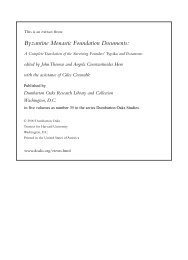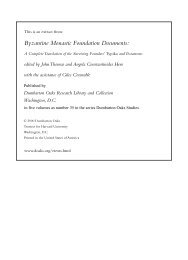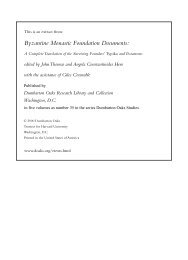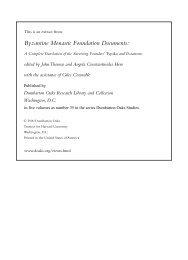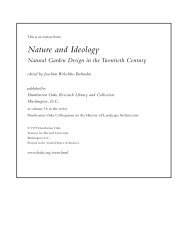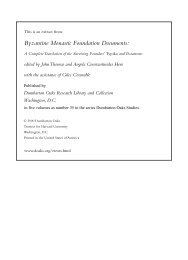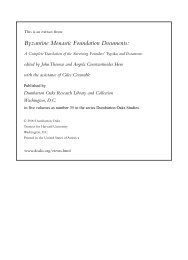Changing Economic Patterns in Latin Romania - Dumbarton Oaks
Changing Economic Patterns in Latin Romania - Dumbarton Oaks
Changing Economic Patterns in Latin Romania - Dumbarton Oaks
Create successful ePaper yourself
Turn your PDF publications into a flip-book with our unique Google optimized e-Paper software.
David Jacoby [ 231 ]<br />
<strong>Romania</strong> reached Dubrovnik, and traders also traveled to Barcelona on their way to<br />
Saragossa <strong>in</strong> Spa<strong>in</strong>, though it is unclear on which ships. In short, by the fourteenth century<br />
the Greeks were firmly <strong>in</strong>serted with<strong>in</strong> the geographic pattern of Lat<strong>in</strong> <strong>Romania</strong>’s<br />
seaborne trade, with certa<strong>in</strong> limitations. 209<br />
The activity of these Greeks calls for a few remarks. It was generally based on relatively<br />
small amounts of capital and conducted with the help of small and medium-sized ships<br />
hav<strong>in</strong>g a limited carry<strong>in</strong>g capacity, manned by Greek or mixed crews. 210 Greeks only<br />
seldom participated directly <strong>in</strong> trans-Mediterranean traffic and, <strong>in</strong> any event, were totally<br />
excluded from commercial patterns sponsored by the Venetian government and directly<br />
subject to its control. The transportation of precious goods on board state galleys and<br />
the leas<strong>in</strong>g of these ships were the exclusive preserve of Venetian citizens. It is therefore<br />
obvious that, despite their numbers, <strong>in</strong> terms of capital turnover and profits the Greeks<br />
of Lat<strong>in</strong> <strong>Romania</strong> had a fairly limited share <strong>in</strong> medium and especially <strong>in</strong> long-distance<br />
maritime trade. Nevertheless, some of them based <strong>in</strong> the major transit ports greatly benefited<br />
from the general <strong>in</strong>crease <strong>in</strong> economic and maritime activity and managed to accumulate<br />
considerable wealth <strong>in</strong> related activities, such as bank<strong>in</strong>g. Çan Cremolisi, a Greek<br />
resident of Coron, provided loans total<strong>in</strong>g 35,000 gold ducats to the lord of Cor<strong>in</strong>th,<br />
Nerio Acciaiuoli, the reimbursement of which he sought for several years after the latter’s<br />
death <strong>in</strong> 1394. 211 In the first half of the fifteenth century, high officials of Byzant<strong>in</strong>e<br />
Morea were deposit<strong>in</strong>g valuables and cash <strong>in</strong> Coron and Modon <strong>in</strong> private banks operated<br />
by Greeks, who used the same sophisticated commercial techniques as their Lat<strong>in</strong><br />
counterparts. 212 In the same period a Greek family, the Filomati from Crete, settled <strong>in</strong><br />
Venice and adopted a bus<strong>in</strong>ess strategy rest<strong>in</strong>g on the dispersal of its members, as commonly<br />
practiced by Venetian mercantile families, position<strong>in</strong>g some <strong>in</strong> Crete and one <strong>in</strong><br />
Constant<strong>in</strong>ople. Incidentally, some prom<strong>in</strong>ent Byzant<strong>in</strong>e families appear to have acted<br />
<strong>in</strong> the same way both with respect to the Byzant<strong>in</strong>e prov<strong>in</strong>ces and the cities of Lat<strong>in</strong><br />
<strong>Romania</strong>, namely, Venetian Coron and Modon. 213<br />
So far we have noted two important economic functions fulfilled by Lat<strong>in</strong> <strong>Romania</strong><br />
209 On this pattern, see Jacoby, “Venezia d’oltremare,” 272–73; idem, “Cretan Cheese,” 57–60; idem,<br />
“Creta,” 83–84; S. Borsari, “Ricchi e poveri nelle comunità ebraiche di Candia e Negroponte,” <strong>in</strong> Maltezou,<br />
Plousíoi (as above, note 144), 213–14, 216–18, on Cretan Jews provid<strong>in</strong>g maritime loans for trade with Cyprus,<br />
Alexandria, the Aegean islands, and Venice, partly on board Greek ships; B. Krekić, Dubrovnik (Raguse) et le<br />
Levant au moyen âge (Paris, 1961), 99–100, 103, 125–50; Gall<strong>in</strong>a, Società, 123–27.<br />
210 See Gaspares, Nautiliakh` kínhsh, 293–305 (tables), and for a mixed crew with the sailors’ names, ibid.,<br />
289–90 n. 9; mixed crew also on a small Venetian ship around 1270: TTh, 3:274–75. Further examples of small<br />
vessels appear above.<br />
211 See J. Chrysostomides, “Merchant versus Nobles: A Sensational Court Case <strong>in</strong> the Peloponnese (1391–<br />
1404),” <strong>in</strong> Praktikà tou' D Dieqnou'" Sunedríou Peloponnhsiakw'n Spoudw'n (1992–93), 2:116–31, and<br />
for the documents, see now Chrysostomides, Monumenta, 626, General <strong>in</strong>dex, s.v. “Cremolisi, Court case.”<br />
212 See K.-P. Matschke, “Geldgeschäfte, Handel und Gewerbe <strong>in</strong> spätbyzant<strong>in</strong>ischen Rechenbüchern und <strong>in</strong><br />
der spätbyzant<strong>in</strong>ischen Wirklichkeit: E<strong>in</strong> Beitrag zu den Produktions- und Austauschverhältnissen im byzant<strong>in</strong>ischen<br />
Feudalismus,” Jahrbuch für Geschichte des Feudalismus 3 (1979): 187–88; idem, “Griechische Kaufleute am<br />
Übergang von der byzant<strong>in</strong>ischen Epoche zur Türkenzeit,” <strong>in</strong> Lauer and Schre<strong>in</strong>er, Kultur Griechenlands (as <strong>in</strong><br />
note 7), 78–79.<br />
213 Ibid., 77–78; Matschke, “Geldgeschäfte,” 195–96; on the Filomati, see now D. Jacoby, “I Greci ed altre<br />
comunità fra Venezia ed oltremare,” <strong>in</strong> I Greci a Venezia, nel V centenario della fondazione della comunità greca, ed.<br />
M. F. Tiepolo (Venice, 2000), <strong>in</strong> press; for the Lat<strong>in</strong>s, see D. Jacoby, “La dimensione demografica e sociale,” <strong>in</strong><br />
Cracco and Ortalli, Storia (as above, note 149), 2:703.




